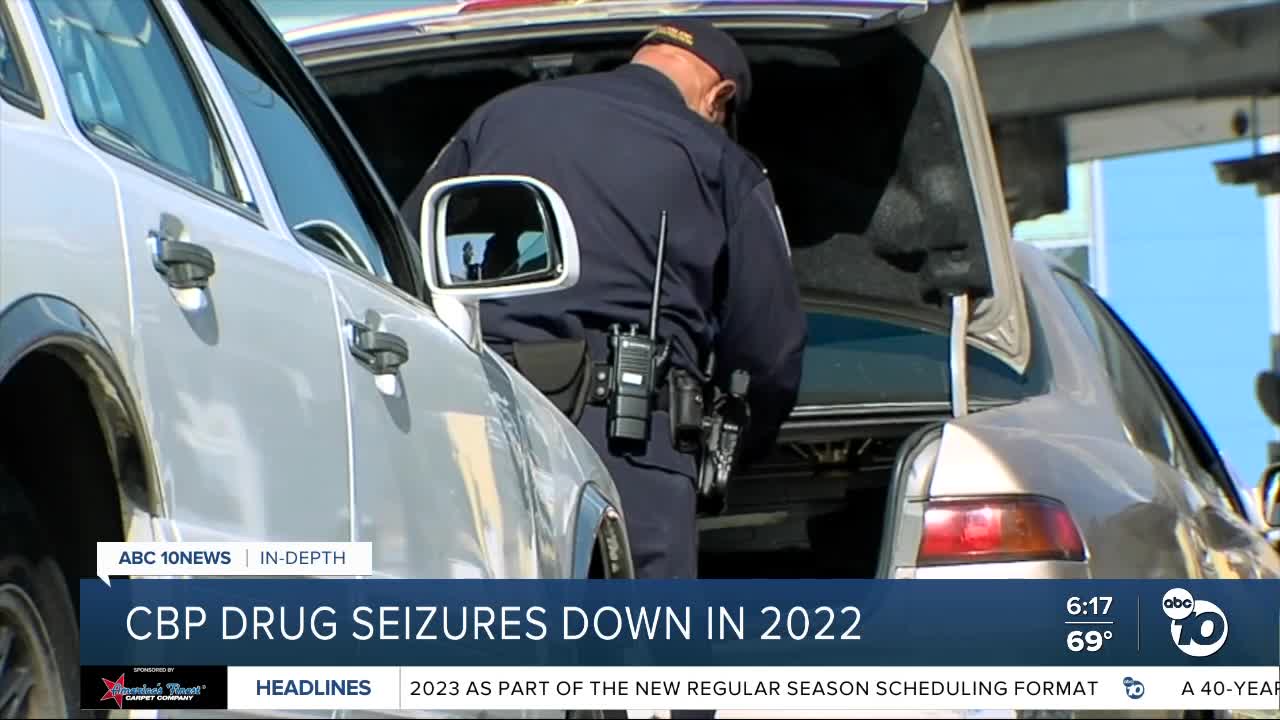SAN DIEGO (KGTV) - New data from Customs and Border Protection show that fewer drugs have been intercepted along the San Diego-Mexico border in 2022 than in any of the previous three years.
According to numbers posted on the CBP website, 105,457 pounds of illicit drugs have been seized in FY 2022 by agents in the San Diego and El Centro sectors of the border. There are still two months left in the fiscal year.
That's lower than 2021 (159,904 lbs), 2020 (262,464 lbs), and 2019 (224,256).
But lower numbers don't necessarily mean a drop in the overall amount of drugs being smuggled across the border.
"We've definitely seen some changes in recent years," says Dr. David Shirk, the Chair USD's Political Science Department. He also runs "Justice in Mexico," a think tank that analyzes crime across the border.
Dr. Shirk says the amount of illegal drugs seized stays at the same proportion of the total amount being moved across the border. So lower numbers from CBP typically mean lower amounts of smuggling.
But, he says a deeper look at the numbers reveals some disturbing truths.
First, Dr. Shirk points out that the legalization of marijuana in California and several other states across the country has dramatically reduced the market for illegal cannabis, which used to make up a significant proportion of smuggling.
A study from Justice in Mexico found "a substantial and statistically significant decrease in the amounts of cannabis apprehended by Mexican and U.S. border authorities in relation to the rate of legalization in the United States."
According to CBP, they've only seized 1,276 pounds of marijuana in the San Diego/El Centro region this fiscal year. In 2020, that number was 142,211 pounds.
But, that same study looked at how marijuana legalization has impacted the flow of other illicit drugs. It found "... as legal access to cannabis has increased, flows of other illicit drugs increased simultaneously, suggesting that criminal organizations have diversified into other drugs to remain profitable."
"The cheaper alternative of synthetic drugs has made it just an easier drug for illicit producers to get into the United States get into the hands of consumers," Dr. Shirk adds.
CBP numbers back up the study. The amount of Fentanyl seized in 2022 will surpass all of the three prior years. CBP has already intercepted 6,571 pounds at the border, with two months to go in the fiscal year. In all of last year, they found 6,828 pounds. That was a significant increase from 2020, where they found 2,839 pounds. In 2019, they stopped 1,638 pounds.
Methamphetamine is also increasing. In 2019, CBP stopped 87,239 pounds. That number rose to 102,956 pounds in 2020 and 116,682 pounds in 2021. So far this year, they've found 88,612 pounds. That's on pace to match the 2020 numbers.
Dr. Shirk says the increase of synthetic opioids is disturbing, because they're more potent than marijuana.
"You're comparing apples and oranges," he says. "If you look at a pound of marijuana versus half a pound of cocaine, there's a big difference in the impact of those drugs... A pound of fentanyl will kill a lot more people than a pound of marijuana."
So while the overall weight may be dropping, the danger isn't.
That's why Dr. Shirk believes the US needs to use searches and seizures as a part of a larger anti-drug campaign. He'd like to see more focus on mental health and addiction treatment to lessen the demand. He says if Americans stop taking illegal drugs, the cartels will stop smuggling them.
"Legalization has solved part of the problem, perhaps," says Dr. Shirk. "But there's still a big part of the problem that continues to kill Americans, make powerful criminal organizations rich, and allowed them to corrupt and inflict violence on countries like Mexico."
"We've got a long way to go to solving this problem."




